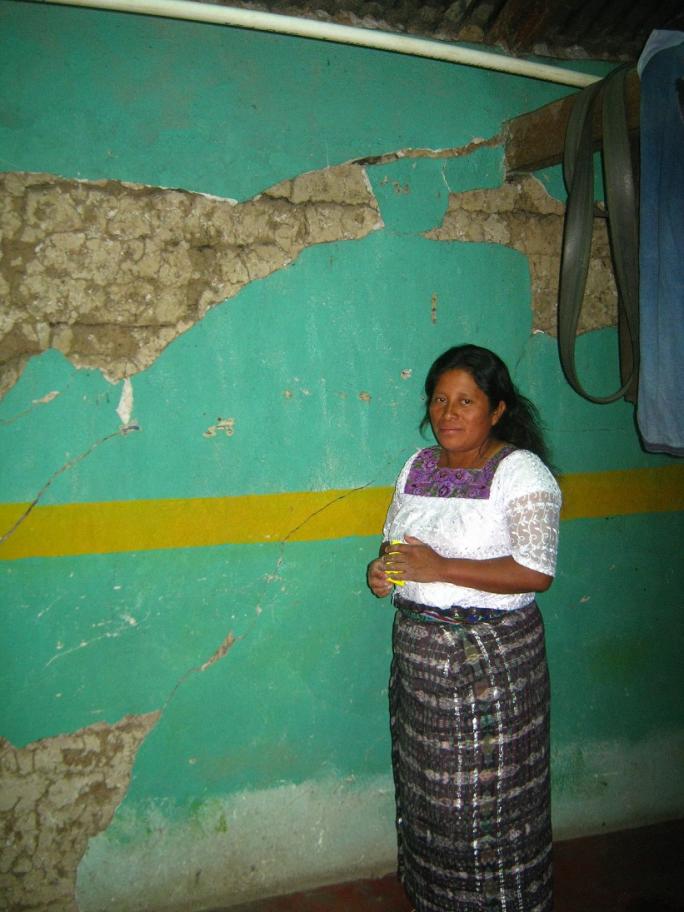Photo Credit: Amnesty International Canada
On March 2 the Federal Court of Canada will hear a case alleging that the Canadian government is improperly withholding information about its diplomatic interventions on behalf of a Canadian company accused of human rights abuse at its mine in Guatemala.
The lawsuit, filed by Shin Imai, York University law professor and co-founder of the Justice & Corporate Accountability Project (JCAP), is supported by several civil society organizations including Amnesty International Canada.
It asks the court to order Global Affairs Canada to remove the redactions on 20 pages of documents detailing Canadian officials’ communications with the Guatemalan government and the Inter-American Commission on Human Rights (IACHR) after the commission called for Goldcorp’s Marlin mine to be shut down in 2010.
The call came after 18 Maya-Mam communities filed a complaint in 2007 with the IACHR over human rights abuses, environmental damages, and health impacts. The petition alleged that the communities were not consulted before mining concessions were granted, and that mining activities were depleting and contaminating their water resources and harming the health of local residents. The commission ordered the shutdown as an urgent precautionary measure while it further considered the case. It also requested that Guatemala take all necessary measures to “guarantee the life and physical integrity” of the affected Indigenous communities, in particular by decontaminating their water sources and ensuring access to potable water and to medical attention, as appropriate.

At first it appeared that Guatemala might comply with the IACHR’s request to shut down the mine. The government announced in June 2010 that it would begin an administrative process to suspend operations. Then in July 2011 it reported that its administrative process had not identified sufficient evidence to support the suspension.
The IACHR then modified its request, urging the government to “take the necessary measures” to ensure the communities’ water was not contaminated by the mine, but no longer calling for its suspension.
The mine continued to operate up to 2017, when it reached the end of its commercial viability.
Impacted communities continue to raise serious concerns about the ongoing impacts of the mine. These concerns relate to contamination, damage to local buildings and lack of access to potable water. Community members also raise grievances about Goldcorp’s local “development” projects and their failure to yield long-term benefits. Finally, local residents express concerns about whether the mine will be closed safely and how they will access remedy for the mine’s adverse impacts.
What Canada’s disclosure revealed
Professor Imai made two access-to-information requests in 2014, seeking disclosure of communications between Canadian government officials, the Canadian embassy in Guatemala, Goldcorp, the IACHR and Guatemalan authorities between 2010 and 2011.
Global Affairs Canada provided five different release packages to Mr. Imai following his requests and his subsequent complaint to the Office of the Information Commissioner. While many of the key details they contain are blacked out, the emails, meeting notes, talking points and other documents obtained show that Canadian officials undertook extensive lobbying of Guatemalan and IACHR decision-makers, and assisted Goldcorp in doing likewise.
What Canada concealed
The government refuses to disclose redacted information on 20 pages of documents. It claims that the information is exempt from release under the Access to Information Act because it was obtained in confidence from the government of Guatemala or the IACHR; its release would result in probable harm to Canada’s international relations or to Goldcorp’s competitive position; or its release would undermine the neutrality of the public service and its ability to provide frank advice to government.
The documents include records of communications with Goldcorp, with Guatemalan and IACHR officials, and between Canadian diplomats and embassy staff, as well as notes from a meeting between the Canadian ambassador to the Organization of American States and Goldcorp’s vice-president.
In many cases Global Affairs Canada cannot explain how it satisfied established legal tests to justify the exemptions it claims. For example, it is unable to say what factors it considered in determining that disclosure would harm Goldcorp. It made this assessment without consulting the company and continued to provide this justification even after the mine had closed and after Goldcorp was purchased by an American company.
Why this case matters
Mr. Imai’s lawsuit argues that there is a clear public interest in disclosing the records. The public must be able to scrutinize the extent to which the Canadian government acted in the service of Goldcorp’s interests, while undermining Indigenous communities’ efforts to defend their rights. This disclosure would inform broader public debates regarding mining industry influence over Canadian foreign policy and the government’s compliance with its own policies and international human rights law.
The case also highlights broader concerns regarding Canada’s access-to-information system, notably the broad use of exemptions to avoid accountability, competence and timeliness in government responses to requests, and the Office of the Information Commissioner’s effectiveness in guaranteeing the public’s right to access information. The current review of the Access to Information Act must address these concerns.https://platform.twitter.com/embed/Tweet.html?dnt=false&embedId=twitter-widget-2&features=eyJ0ZndfZXhwZXJpbWVudHNfY29va2llX2V4cGlyYXRpb24iOnsiYnVja2V0IjoxMjA5NjAwLCJ2ZXJzaW9uIjpudWxsfSwidGZ3X2hvcml6b25fdHdlZXRfZW1iZWRfOTU1NSI6eyJidWNrZXQiOiJodGUiLCJ2ZXJzaW9uIjpudWxsfSwidGZ3X3R3ZWV0X2VtYmVkX2NsaWNrYWJpbGl0eV8xMjEwMiI6eyJidWNrZXQiOiJjb250cm9sIiwidmVyc2lvbiI6bnVsbH19&frame=false&hideCard=false&hideThread=false&id=1366835527597445121&lang=en&origin=https%3A%2F%2Fwww.amnesty.ca%2Fblog%2Fottawa-must-disclose-how-it-aided-canadian-mining-company&sessionId=c68645c197f1d5ae838d7b0975141d7423899b39&theme=dark&widgetsVersion=82e1070%3A1619632193066&width=550px
Hearing details
The court will hear the case remotely on March 2, 2021 at 9:30 a.m. CST (10:30 a.m. EST). The court file number is T-1170-19 and the style of cause is Shin Imai v. Canada (Minister of Foreign Affairs). Members of the media wishing to obtain a court document should email FC_Reception_CF@cas-satj.gc.ca.
To learn more, please visit https://cnca-rcrce.ca/issues-analysis/canadas-diplomatic-support/
Read our press release in English and Spanish






















